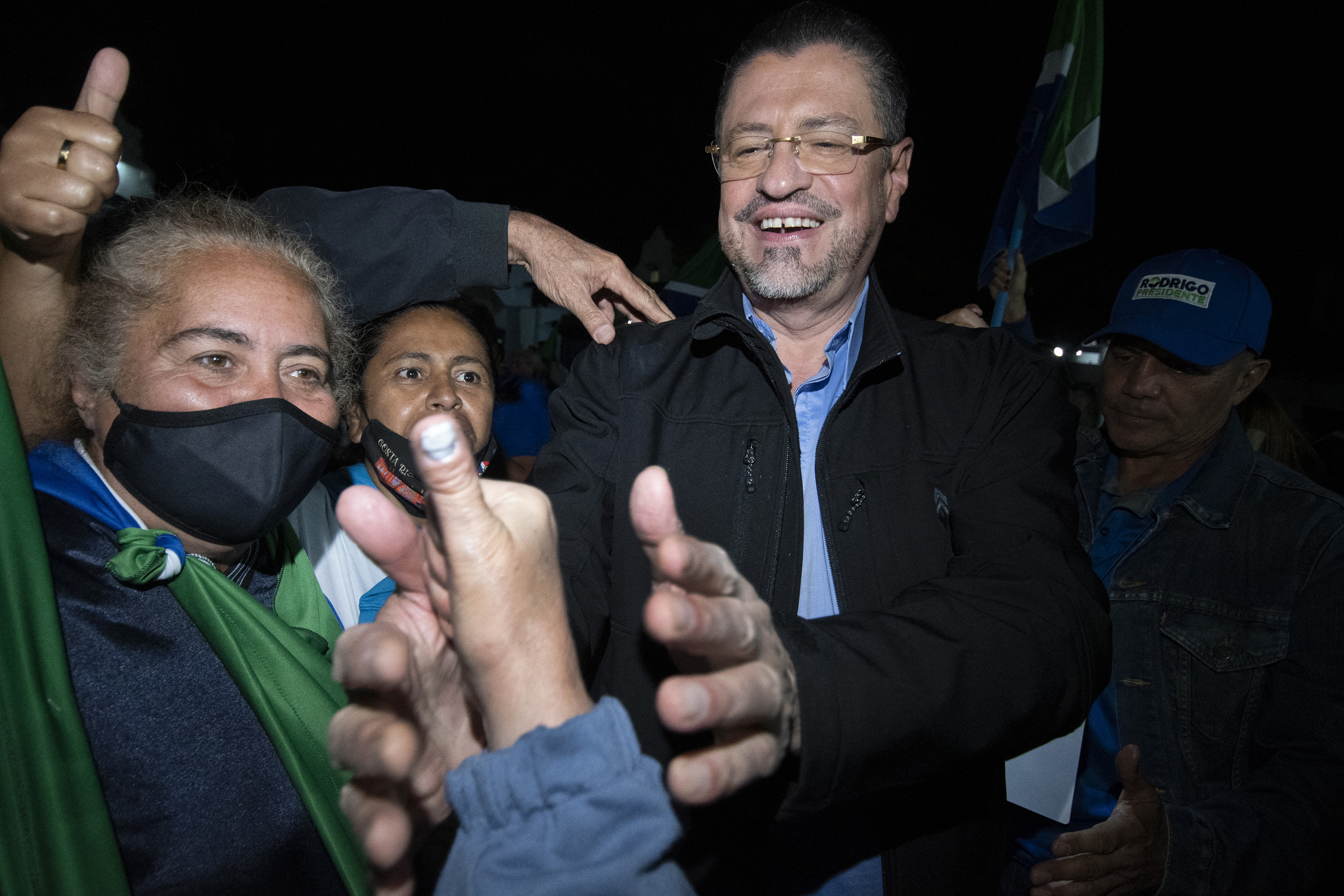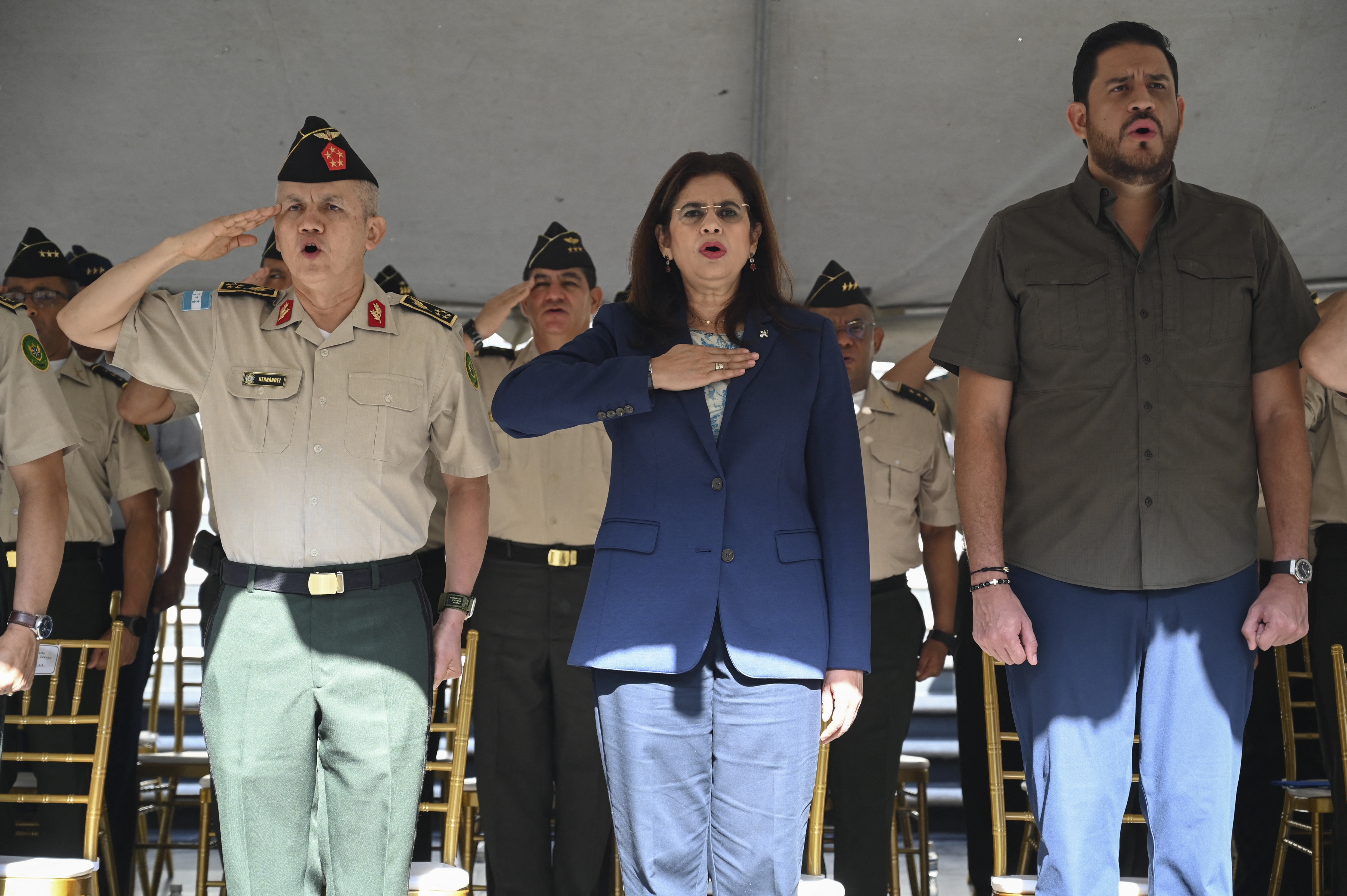The following is a transcript of episode 30 of the weekly El Faro English podcast, Central America in Minutes.
CHAVES: We see a judiciary that selectively applies the law. The same law is applied differently depending on who is concerned.
GRESSIER, HOST: Costa Rican President Rodrigo Chaves is on the defensive, decrying a series of corruption cases against him as a vendetta. Based on evidence of corruption first revealed by the press, the Supreme Court is weighing whether to continue the process to strip Chaves’ immunity from prosecution. This is unprecedented for a sitting president in Costa Rica.
A key cooperating witness
Evidence of corruption has trailed Chaves since even before he took office in 2022, when he refused to disclose his campaign financiers and faced accusations of paying expenses through an unofficial slush fund.
During his tenure, prosecutors have opened dozens of inquiries. They often involve some form of alleged influence-peddling — like when the son of a campaign advisor received a port concession, or when businessmen close to his campaign were given a permit to deforest a protected area.
Two weeks ago, the Attorney General’s Office launched raids and arrests in an investigation called Pista Oscura, or “Dark Runway”, implicating Chaves and over a dozen public-works officials. They stand accused of declaring a state of emergency without cause, to divert millions of dollars from an emergency fund and patch up an airport runway at an inflated price.
CHAVES: It’s a circus, a waste of resources, an affront to the national conscience.
GRESSIER: In an editorial, newspaper La Nación called the case part and parcel of an “excessive use of emergency decrees.” While campaigning, Chaves promised to “destroy” La Nación and other news outlets. The Supreme Court put its foot down to get his administration to back off from harassing their parent company.

In 2023, La Nación tugged on the threads of an even more damning revelation: that, shortly after taking office, Chaves steered a contract to an insider communications producer for a public-relations campaign to promote his image. And the check was cut with funds from the Central American Bank for Economic Integration.
Next, the contractor told prosecutors that the president coerced him into giving a kick-back of $32,000 from the awarded contract to a top advisor, who was putting down money on a home.
The following is audio surreptitiously recorded in his office by Communications Minister Patricia Navarro and published two years ago by La Nación, and now released to El Faro English for republication. First is Chaves speaking, followed by the producer in question, Christian Bulgarelli. The contract had yet to be issued.
CHAVES: Alright, well, I would just like to see the contract, because I also have an appetite for many things.
BULGARELLI: As you wish, sir.
NAVARRO: As the captain orders.
BULGARELLI: I’ll bring you my two right-hand men, our two right-hand men.
CHAVES: No, don’t worry. If this gentleman can simply let me see the contract, and I’ll give it a… and maybe ask for a few… what are they called?
BULGARELLI: Chineos [treats].
CHAVES: Unos chineos, cariñitos [A few treats, caresses].
BULGARELLI: 100 percent, yes.
CHAVES: Not in a bad way, don’t think I mean that…
GRESSIER: One year remains in Chaves’ term. If the Supreme Court finds the case to have merit, next the legislature will hold an inquiry to determine whether to vote to strip him of immunity. Chaves, the firebrand, lashed out at the high court and called for Attorney General Carlo Díaz to resign, convening his base in April to rally in his defense. Sounding particularly annoyed, he claimed on Wednesday that prosecutors “have no evidence.”

After the rigged procurement came to light, the regional bank launched an investigation. But, as Natasha Cambronero, investigations editor for La Nación, recalls, they found only the contractor, Bulgarelli, responsible. Incredulous, he struck a deal with prosecutors and became a cooperating witness in a probe leading directly back to the president’s office.
CAMBRONERO: The fact that a person involved in the events recounted what happened, and provided evidence of a supposed payment for a person to obtain a contract, made this case advance more quickly than the others.
Top cabinet vacancy in Honduras
GRESSIER: Last, an important update from the Honduran electoral process. On Wednesday, Honduran Defense Minister Rixi Moncada announced her resignation, as required by law, six months prior to the November 30 election.
Moncada, a headstrong former finance minister close to the Castro-Zelaya presidential family, will compete as the big-ticket candidate for Libre as the left-wing ruling party seeks a second term over the Trump-aligned National and Liberal Parties.
Moncada ran for the Libre ballot in March while, as the head of the Armed Forces, serving as guarantor of the electoral process — a move criticized in Honduras and internationally as a direct conflict of interest. In the wake of the primary, the Ministry of Defense and National Electoral Council sparred in nakedly partisan tones over who was to blame for irregularities, including a break in the chain of custody of ballots.

The Ministry wrote on X this week that, in her eight months in the cabinet post, Moncada “strengthened bilateral relations with the United States.” It was certainly true that she helped run damage control after the Castro administration, in January, initially threatened to expel a key Southcom military base in Honduras in retaliation for Donald Trump’s deportation agenda.
In an April visit to Fort Buchanan in Puerto Rico, Rixi Moncada seemed to deftly blend her public profile as defense minister and ruling-party presidential hopeful, publicly telling the U.S. Army that “our medium- and long-term goals are to maintain a positive relationship with the U.S. on security issues,” especially the fight against drug trafficking.
Rather than name a replacement for Moncada among the deputies in her cabinet or another member of her circle, President Xiomara Castro announced that she will “temporarily” step in as interim defense minister. She had named Moncada in September in the political fallout of the publication of a video showing her brother-in-law Carlos Zelaya as an intermediary with drug traffickers to her 2013 campaign war chest.

Castro, who famously extradited now-convicted narco-president Juan Orlando Hernández to the United States upon taking office in 2022, denounced the revelation as part of an international coup effort and appointed Moncada, a loyal party lieutenant, to get a tighter grip on the military.
She then quickly announced that Honduras would denounce the U.S. extradition treaty on sovereignty grounds, citing U.S. criticism of the Honduran military’s mingling with Venezuelan military counterparts sanctioned by the U.S. as drug trade operatives.
But in February, Honduras backed off, agreeing with the Trump administration that the extradition treaty —at least for this election year— will continue.
Roman Gressier wrote today’s episode, with production and original soundtrack by Omnionn. Subscribe on Apple, Spotify, Amazon, YouTube, and iHeart podcast platforms.
